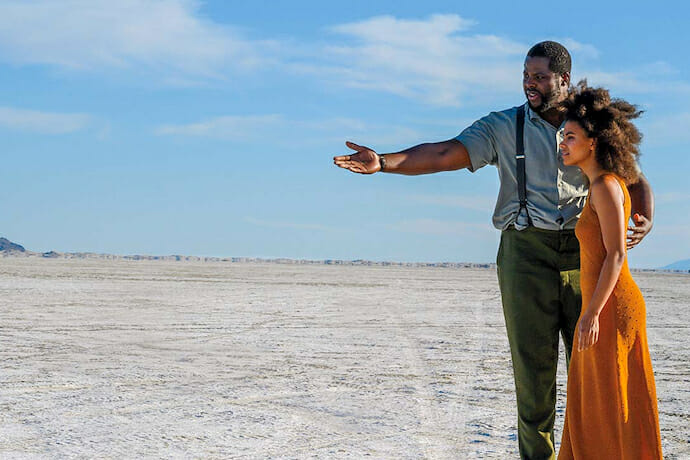Review of Edson Oda’s ‘Nine Days’
The meaning of life is an ambitious topic to tackle for any filmmaker, but certainly as a first feature film. Japanese-Brazilian writer-director Edson Oda not only doesn’t shy away from existential questions, but he has also found a creative way of exploring these. Nine Days leaves us with plenty to discuss after viewing. His approach is often bleak and slow-moving, yet his film excels in pushing us to examine our own attitude and appreciation for the gift of life.
Winston Duke (Us, 2019) stars as Will, a kind of guardian angel charged with selecting the replacement souls after deaths occur on his watch. Will has a wall of old-style tube TVs, each with its own VCR wired up. He spends his time watching folks go about their lives. He takes notes and maintains files. See, those he watches are the ones Will previously selected for life. He picks his team, but he no longer plays the game (although he was once alive). His job now is to tweak humanity in the right direction by selecting “good” souls who are tough enough to handle life – not overly sensitive types, and certainly not those too self-centered.
There is no denying Oda’s film is high-concept, and some may outright dismiss his premise. What if pre-life was a competition to determine worthiness? Will sets up nine days of interviews for the next round of souls. Of course, some won’t last the full nine days, but the process involves a series of quizzes as the candidates watch the wall of TVs and offer up their answers to Will’s questions. Well, all but one, that is. Emma (Zazie Beetz, Joker, 2019) is a free-spirited soul who sees Will for what he is and what he was. She answers his questions with her own questions, or simply states that she can’t answer. He is intrigued and frustrated by her willingness to play this out in her own way.

Tony Hale (“Veep”) and Bill Skarsgard (It, 2017) are a couple of the other candidates, and each has their moments to shine. Benedict Wong (Doctor Strange, 2015) plays Kyo, Will’s co-worker and the one who assists him with the interview process. Kyo also strives to make sure Will maintains some humanity, despite a recent event that shook him to his core, and now has Will second-guessing himself. As Emma slowly gets Will to open up about his ‘alive’ time, we also see how Will recreates a special moment for the candidates as they are dismissed and providing them with a taste of life.
A ‘taste of life’ is fitting because the point Oda is trying to make is that the best parts of life are emotions and sensations – the intangibles that bring joy, fear, and sadness. It’s not all cupcakes and unicorns, and being so tough to block out the senses is not the best way of living. Without him realizing it, Emma helps Will re-connect with his inner-being of when he was alive. His re-awakening is a highlight.
The candidates are informed that, if chosen, their memories will be wiped clean, yet “you’ll still be you.” This conforms to the theory that much of who we are is inherent at birth. Again, some may disagree. Oda’s film will inspire thought and debate. If each of us aced our pre-life interviews, let’s make the most of it! This is a terrific film with a unique look and style, and a standout performance from Winston Duke. We can only hope enough folks take the time to watch and think about the message.

